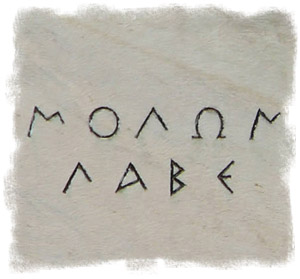
 |
| MAIN |
| Introduction |
| Greek Preparations |
| Armies |
| Battlefield |
| Battle |
| Aftermath |
| Date |
| Monuments |
| COMPLEMENTARY |
| Thermopylae |
| Leonidas I |
| Xerxes I |
| Sparta |
| Thespiae |
| Molon Labe |
| Molon
Labe |
|
|
Molon
Lave! Grammar The first word "μολών" (molon), is the aorist active
participle (masculine, nominative, singular) of the Greek The two words function together in a grammatical structure not present in English called the circumstantial participle. Where English would put two main verbs in two independent clauses joined by a conjunction: "come and take", a strategy sometimes called paratactic, ancient Greek, which is far richer in participles, subordinates one to the other, a strategy called hypotactic: "coming take". The first action is turned into an adjective. The English speaker can understand it with a little thought, but he would never use it. In this structure the participle gives some circumstance attendant on the main verb: the coming. The Greek has a nuance not present in the English: aspect. The aorist participle is used to signify completed action, called the perfective aspect. Moreover, the action must be completed before the time of the main verb. The difference in meaning is subtle but significant: the English speaker is inviting his enemy to begin a process with two distinct acts or parts — coming and taking; the Greek speaker is telling his enemy that only after the act of coming is completed will he be able to take. In addition there is a subtle implication: in English "come and take it" implies that the enemy might not win the struggle — the outcome is uncertain; in Greek in the implication is that the outcome is certain—"after you have come here and defeated me, then it will be yours to take." History "Μολών λαβέ" was the response of King Leonidas I of Sparta to Xerxes I of Persia at the onset of the Battle of Thermopylae. Xerxes, whose forces vastly outnumbered the Spartans and their allies, offered to spare the lives of Leonidas and his few thousand defenders if only they would lay down their weapons. Instead, the Spartans held Thermopylae for three days and, while they died to the last man, they inflicted serious damage on the Persian army, delaying it and essentially preventing the conquest of the Greek Peninsula. When he uttered this response Leonidas was completely aware that he and all his men were doomed. Leonidas had known this since before leaving Sparta. So his response "Μολών λαβέ" might best be rendered into English as "After you finish coming here (we will be dead) then you can take our weapons." The source for this quotation is Plutarch, Apophthegmata Laconica, 225c.11. This work may or may not be by Plutarch himself, but it is included among the Moralia, a collection of works attributed to him but outside the collection of his most famous works, the Parallel Lives. Modern usage In the Anglo-American world, the phrase is often heard from pro-gun activists as a proclamation of the natural right to keep and bear arms (see the Second Amendment to the United States Constitution or the English Bill of Rights 1689) and as a challenge to those supporting stricter gun control laws (or what they fear would be a government seizure of firearms). It began to appear on pro-RKBA web sites in the late 1990s and early 2000s. The motto ΜOΛΩΝ ΛΑΒΕ is on the emblem of the Greek First Army Corps. The term has been recently used in the feature film 300 (and comic of the same name), Leonidas can be heard reciting this famous line.
Permission is granted to copy, distribute and/or modify this article under the terms of the GNU Free Documentation License, Version 1.2 or any later version published by the Free Software Foundation.
(What does it mean?)
The text is based on material from the Wikipedia article "Battle of Thermopylae". Modifications, additions to the Wikipedia text and all the photos by the website author. |
 verb "βλώσκω",
meaning "having come". "Λαβέ" is the aorist
active imperative (second person singular) of the verb "λαμβάνω",
translated "take".
verb "βλώσκω",
meaning "having come". "Λαβέ" is the aorist
active imperative (second person singular) of the verb "λαμβάνω",
translated "take".